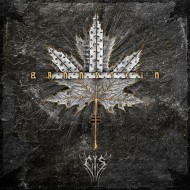 After some tumultuous changes which led up to 2012’s emotional and icy blast Wetterkreuz, things for Eïs seem to be settling down and providing the perfect backdrop for their latest album. A more permanent line-up has emerged and the name change (from Geïst following a legal threat from a German rock band of the same name) has resulted in a moniker which seems to sum up the band’s bleaker, serrated edges very nicely indeed. As ever, the driving force of the band, as you might have guessed in the realms of black metal, is down to one man. Alboin combines those frost sharpened riffs with gravel vocals and always manages to leave plenty of room for emotional and compositional surprises to seep through – making Eïs the excellent band that it has become.
After some tumultuous changes which led up to 2012’s emotional and icy blast Wetterkreuz, things for Eïs seem to be settling down and providing the perfect backdrop for their latest album. A more permanent line-up has emerged and the name change (from Geïst following a legal threat from a German rock band of the same name) has resulted in a moniker which seems to sum up the band’s bleaker, serrated edges very nicely indeed. As ever, the driving force of the band, as you might have guessed in the realms of black metal, is down to one man. Alboin combines those frost sharpened riffs with gravel vocals and always manages to leave plenty of room for emotional and compositional surprises to seep through – making Eïs the excellent band that it has become.
Wetterkreuz – referring to a three banded cross erected (and presumably most of the time, as the album cover seems to imply, failing) to ward off storms – sounded like a statement of defiance hurled into the face of the world. This time round the storm has cleared and Bannstein (named after a prophetic Ban Stone) edges away from so much introspection and a little more towards a world view – grim though that view may be. It feels like there’s a little more room now that the maelstrom has subsided even though the after effects of the storm can clearly be felt. Peering into the lifting gloom Bannstein reveals itself as a mournful commentary on man’s inevitable fate – and its impending doom.
The first track Ein Ietzes Menetek sets an ominous tone although is a more bombastic affair than much of the rest of the album acting as an appropriate handover from the pounding climates of Wetterkreuz. The mood turns more solemn with the next of the five tracks with Im Noktuarium rising like a sorrowful ode to opportunities lost or that never were. The mid-paced dirge reminds me a little of Nargaroth although Eïs’s more generous use of keyboards gives the sound less of a barren edge than Ash does. Better comparisons to Eïs’ sound are perhaps more easily found in other pagan black metal realms – where Geïst’s three albums before the name change are more firmly rooted. Kampfar and Helrunar would be good starting points and there are definitely Falkenbach influences creeping into Bannstein on the loping, slower paced tracks.
It’s at this decelerated melancholic tempo that Bannstein finds its identity. The title track – Uber Den Bannstein – collapses into a swaying mournful march in its middle section before rising again and then finally merging the two parts of the track together into a glorious conclusion. The two final tracks are probably the most singular on the album. The fourth beginning with a classic Eïs sound and ending with an impressive flashing riff towards the end which could even have been borrowed from Vyre, the band which his former band mates broke off to form in 2011.
The bleak and rousing final track which closes the album pulls on the heart-strings and proves once again that Eïs has moved the creative dial on in terms of overall sound from previous releases. The kind of simplicity and attention to detail that makes this kind of melodic-tinged black metal so appealing before drifting off into eternity and leaving us in no doubt whatsoever how Alboin feels about the fate of mankind.
Bannstein brings together the crushing Wetterkreuz with a more thoughtful version of Eïs that may even be more addictive. Finding Bannstein’s centre was perhaps sometimes a bit of a struggle and that’s maybe because it’s slightly bi-polar – the lengthy tracks either racing at breakneck speed or ponderously but gloriously oppressive. I’m not sure we’ve quite reached the singular and creative peak of the previous album here. But Alboin has done a good job of expanding its sound here and Bannstein will keep the Eïs ball rolling ever forwards.
(8/10 Reverend Darkstanley)

Leave a Reply